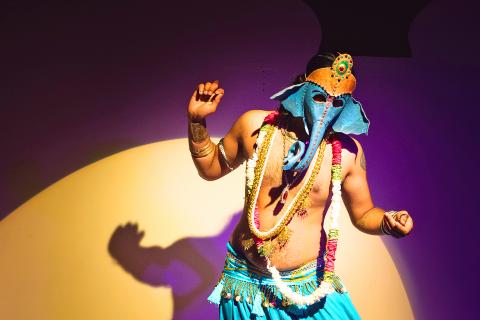Terrence McNally’s A Perfect Ganesh proves to be the most ambitious and challenging play that LAB Space has undertaken this year.
Director Brook Hall admits to seeking the challenge, showing how LAB Space’s black box theater can do a play involving multiple scene and costume changes as well as including the intriguing exoticism of India.
A different challenge comes from McNally himself who pairs two stereotypical middle-aged Connecticut women. They are friends, but each has her secrets. Together they have foregone another “boring” vacation in the Caribbean to take on a personal and spiritual “passage to India.”

Photo courtesy of Fabian Hamacher
McNally frames the play as a situation comedy, but he also has other thematic goals in mind such as gay acceptance, AIDS, personal loss and redemption.
The play’s successful denouement depends on a better understanding of the origin and role of omni-present Ganesh, the god of wisdom in the Hindu pantheon.
Stephen Rong, who plays the character Man, comes through in a role that requires much diversity as he plays many separate supporting parts.
The two women face separate secret demons as they bond. Margaret (Sue Desimone) must overcome a buried past, hidden behind a brassy front. (“I’ve had my day.”) Katherine (Sharon Landon) grieves at not being able to tell her “imperfect gay” son that she loved him before he passed away. (“All I have left is my anger.”) The women work well including a number of humorous moments as they attempt to handle the diversity of India.
The script, however, is lengthy and creates too much of an ambivalent challenge by further playing this against each woman’s separate redemptive pathos. EM Forster found it best not to mix sit-com with seriousness. This might be why McNally didn’t receive the Pulitzer for the work, though it nominated.
The Taiwan-born Manav Mehta, completes the cast. He wears the challenging Ganesh mask and conveys the compassionate acceptance of life’s diversity.
All in all, Hall continues to build a solid group of actors in Taiwan. The opening night had a few kinks with sound and props, but that did not alter the solid performances.
Jen-Jacques Chen, whose brief puppet animation cleverly explained Ganesh’s origin, deserves mention.
A Perfect Ganesh, partially sponsored by Taipei’s Department of Cultural Affairs, is worth seeing and LAB space is worth supporting.
The play continues tomorrow through Sunday with all shows beginning at 8pm. Tickets are NT$600 and can be bought through www.accupass.com/go/ganesh
For more information on the theater troupe and directions to get there, go to: www.thelabtw.com.

President William Lai (賴清德) yesterday delivered an address marking the first anniversary of his presidency. In the speech, Lai affirmed Taiwan’s global role in technology, trade and security. He announced economic and national security initiatives, and emphasized democratic values and cross-party cooperation. The following is the full text of his speech: Yesterday, outside of Beida Elementary School in New Taipei City’s Sanxia District (三峽), there was a major traffic accident that, sadly, claimed several lives and resulted in multiple injuries. The Executive Yuan immediately formed a task force, and last night I personally visited the victims in hospital. Central government agencies and the

Australia’s ABC last week published a piece on the recall campaign. The article emphasized the divisions in Taiwanese society and blamed the recall for worsening them. It quotes a supporter of the Taiwan People’s Party (TPP) as saying “I’m 43 years old, born and raised here, and I’ve never seen the country this divided in my entire life.” Apparently, as an adult, she slept through the post-election violence in 2000 and 2004 by the Chinese Nationalist Party (KMT), the veiled coup threats by the military when Chen Shui-bian (陳水扁) became president, the 2006 Red Shirt protests against him ginned up by

As with most of northern Thailand’s Chinese Nationalist Party (KMT) settlements, the village of Arunothai was only given a Thai name once the Thai government began in the 1970s to assert control over the border region and initiate a decades-long process of political integration. The village’s original name, bestowed by its Yunnanese founders when they first settled the valley in the late 1960s, was a Chinese name, Dagudi (大谷地), which literally translates as “a place for threshing rice.” At that time, these village founders did not know how permanent their settlement would be. Most of Arunothai’s first generation were soldiers

Among Thailand’s Chinese Nationalist Party (KMT) villages, a certain rivalry exists between Arunothai, the largest of these villages, and Mae Salong, which is currently the most prosperous. Historically, the rivalry stems from a split in KMT military factions in the early 1960s, which divided command and opium territories after Chiang Kai-shek (蔣介石) cut off open support in 1961 due to international pressure (see part two, “The KMT opium lords of the Golden Triangle,” on May 20). But today this rivalry manifests as a different kind of split, with Arunothai leading a pro-China faction and Mae Salong staunchly aligned to Taiwan.